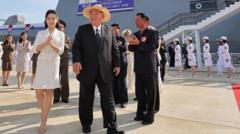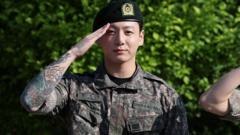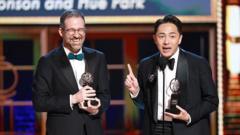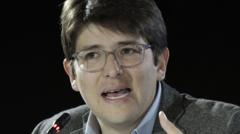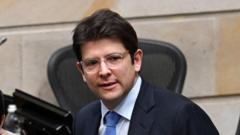With President Yoon's impeachment complete, South Korea faces an urgent need for a new leader while navigating a politically fractured landscape.
South Korea's Political Landscape Shifts as President Yoon Suk Yeol is Impeached
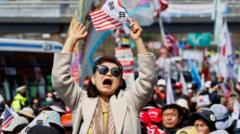
South Korea's Political Landscape Shifts as President Yoon Suk Yeol is Impeached
Unprecedented court ruling sparks calls for unity and constitutional reforms in the midst of deepening societal divisions.
South Korea's political turmoil reached a significant turning point as President Yoon Suk Yeol was officially removed from office following a unanimous decision by the Constitutional Court. This milestone, resulting from Yoon's controversial declaration of martial law last December, has ignited a spectrum of emotions among the public, ranging from elation among critics to despair among supporters.
The court's ruling not only clears the way for a snap election, mandated by law to occur by June 3, but also brings a long-awaited closure to a significant chapter in South Korea's political crisis. However, the ramifications of Yoon's self-provoked turmoil linger, as the echoes of his brief military takeover resonate through society, stirring fears reminiscent of the nation’s authoritarian past.
The grave judgment from the Constitutional Court underlined the gravity of Yoon's actions. The chief judge, Moon Hyung-bae, condemned the president for undermining the very ideals he was sworn to uphold, indicating that the martial law declaration violated fundamental democratic principles. In the wake of this ruling, calls for constitutional reforms are intensifying, with a push for greater checks on presidential power—a task complicated by the necessity of a future president agreeing to limit their own authority.
As Yoon departs, he leaves behind a deeply polarized nation. While many rallied against the martial law attempt, Yoon’s steadfast refusal to concede wrongdoing has fostered a more significant divide, with conspiracy theories gaining traction among a dedicated supporter base. Allegations that the political landscape is riddled with "anti-state forces" have destabilized public trust, with an alarming percentage expressing skepticism toward the integrity of upcoming elections and judicial proceedings.
With tensions high in the lead-up to new elections, the challenge ahead for South Korea's next leader is formidable. The nation must swiftly reposition itself on the global stage, particularly in light of ongoing economic pressure from international partners, including potential tariff ramifications from the United States.
As the country prepares for impending elections, politicians across the spectrum are urging unity, stressing the need to accept the court’s decision as a pathway to healing. Although Yoon himself remains defiant, expressing regret only toward his supporters, the overwhelming consensus is that the nation must now prioritize reconciling its divisions and stabilize its governance framework.
This tumultuous chapter in South Korea’s political evolution underscores not only the fragility of democratic structures but also the resilience of its citizenry, as they stand poised to decide the future trajectory of their leadership.
The court's ruling not only clears the way for a snap election, mandated by law to occur by June 3, but also brings a long-awaited closure to a significant chapter in South Korea's political crisis. However, the ramifications of Yoon's self-provoked turmoil linger, as the echoes of his brief military takeover resonate through society, stirring fears reminiscent of the nation’s authoritarian past.
The grave judgment from the Constitutional Court underlined the gravity of Yoon's actions. The chief judge, Moon Hyung-bae, condemned the president for undermining the very ideals he was sworn to uphold, indicating that the martial law declaration violated fundamental democratic principles. In the wake of this ruling, calls for constitutional reforms are intensifying, with a push for greater checks on presidential power—a task complicated by the necessity of a future president agreeing to limit their own authority.
As Yoon departs, he leaves behind a deeply polarized nation. While many rallied against the martial law attempt, Yoon’s steadfast refusal to concede wrongdoing has fostered a more significant divide, with conspiracy theories gaining traction among a dedicated supporter base. Allegations that the political landscape is riddled with "anti-state forces" have destabilized public trust, with an alarming percentage expressing skepticism toward the integrity of upcoming elections and judicial proceedings.
With tensions high in the lead-up to new elections, the challenge ahead for South Korea's next leader is formidable. The nation must swiftly reposition itself on the global stage, particularly in light of ongoing economic pressure from international partners, including potential tariff ramifications from the United States.
As the country prepares for impending elections, politicians across the spectrum are urging unity, stressing the need to accept the court’s decision as a pathway to healing. Although Yoon himself remains defiant, expressing regret only toward his supporters, the overwhelming consensus is that the nation must now prioritize reconciling its divisions and stabilize its governance framework.
This tumultuous chapter in South Korea’s political evolution underscores not only the fragility of democratic structures but also the resilience of its citizenry, as they stand poised to decide the future trajectory of their leadership.


